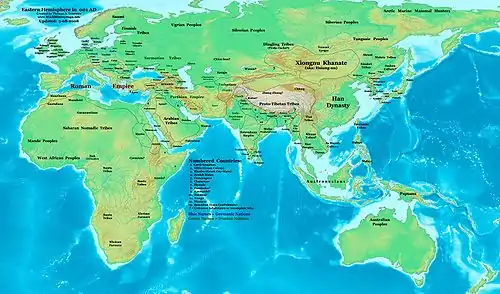AD 1
AD 1 (I), 1 AD or 1 CE is the epoch year for the Anno Domini calendar era. It was the first year of the Common Era (CE), of the 1st millennium and of the 1st century. It was a common year starting on Saturday or Sunday,[note 1] a common year starting on Saturday by the proleptic Julian calendar, and a common year starting on Monday by the proleptic Gregorian calendar. In its time, year 1 was known as the Year of the Consulship of Caesar and Paullus, named after Roman consuls Gaius Caesar and Lucius Aemilius Paullus, and less frequently, as year 754 AUC (ab urbe condita) within the Roman Empire. The denomination "AD 1" for this year has been in consistent use since the mid-medieval period when the anno Domini (AD) calendar era became the prevalent method in Europe for naming years. It was the beginning of the Christian/Common era. The preceding year is 1 BC; there is no year 0 in this numbering scheme. The Anno Domini dating system was devised in AD 525 by Dionysius Exiguus.
| Millennium: | 1st millennium |
|---|---|
| Centuries: | |
| Decades: | |
| Years: |
| AD 1 by topic |
|---|
| Leaders |
| Categories |
|
| Gregorian calendar | AD 1 I |
| Ab urbe condita | 754 |
| Assyrian calendar | 4751 |
| Balinese saka calendar | N/A |
| Bengali calendar | −592 |
| Berber calendar | 951 |
| Buddhist calendar | 545 |
| Burmese calendar | −637 |
| Byzantine calendar | 5509–5510 |
| Chinese calendar | 庚申年 (Metal Monkey) 2697 or 2637 — to — 辛酉年 (Metal Rooster) 2698 or 2638 |
| Coptic calendar | −283 – −282 |
| Discordian calendar | 1167 |
| Ethiopian calendar | −7 – −6 |
| Hebrew calendar | 3761–3762 |
| Hindu calendars | |
| - Vikram Samvat | 57–58 |
| - Shaka Samvat | N/A |
| - Kali Yuga | 3101–3102 |
| Holocene calendar | 10001 |
| Iranian calendar | 621 BP – 620 BP |
| Islamic calendar | 640 BH – 639 BH |
| Javanese calendar | N/A |
| Julian calendar | AD 1 I |
| Korean calendar | 2334 |
| Minguo calendar | 1911 before ROC 民前1911年 |
| Nanakshahi calendar | −1467 |
| Seleucid era | 312/313 AG |
| Thai solar calendar | 543–544 |
| Tibetan calendar | 阳金猴年 (male Iron-Monkey) 127 or −254 or −1026 — to — 阴金鸡年 (female Iron-Rooster) 128 or −253 or −1025 |


.png.webp)
The Julian calendar, a 45 BC reform of the Roman calendar, was the calendar used by Rome in AD 1.
Events
Roman Empire
Asia
- Confucius is given his first royal title (posthumous name) of Lord Baochengxun Ni.
- Sapadbizes, Yuezhi prince and king of Kush (Bactria), dies. Heraios succeeds him as king.
Africa
- The Kingdom of Aksum, centered in modern-day Ethiopia and Eritrea, is founded (approximate date).
- Amanishakheto, queen of Kush (Nubia), dies. Her son, Natakamani, becomes king of Kush.
Americas
- Moxos ceases to be a significant religious area in South America (approximate date).
- The Teotihuacan culture in Mesoamerica begins (approximate date).
- The Olmec 2 phase of the Olmec civilization begins; San Lorenzo and La Venta grow in population.
Arts and sciences
- The poem Metamorphoses is written by Ovid.
Religion
- Birth of Jesus, as assigned by Dionysius Exiguus in his anno Domini era according to at least one scholar.[2][3] However, most scholars think Dionysius placed the birth of Jesus in the previous year, 1 BC.[2][3] Furthermore, most modern scholars do not consider Dionysius' calculations authoritative, placing the event several years earlier (see Chronology of Jesus).[4]
Births
- Izates bar Monobaz, Parthian client king (approximate date)
- Pope St. Peter, Pope in Catholic church (d. AD 68)
- Scribonius Largus, Roman physician (approximate date)
- Sextus Afranius Burrus, Roman praetorian prefect (d. AD 62)
Deaths
- Amanishakheto, queen of Kush (Nubia)
- Artaxias II, king of Iberia (Nimrodid dynasty)
- Gaius Antistius Vetus, Roman consul (b. 50 BC)
- Sapadbizes, king of the Kushan Empire
References
- Velleius Paterculus, The Roman History, Book II. p 271.
- Declercq 2000.
- Declercq 2002.
- Dunn 2003.
Sources
- Declercq, Georges (2000). Anno Domini: The origins of the Christian Era. Turnhout, Belgium: Brepols. pp. 143–147. ISBN 978-2503510507.
- Declercq, Georges (2002). "Dionysius Exiguus and the introduction of the Christian Era". Sacris Erudiri. Brussels: Brepols. 41: 165–246. doi:10.1484/J.SE.2.300491. ISSN 0771-7776.
Annotated version of a portion of Anno Domini
- Dunn, James D. G. (2003). Jesus Remembered. Christianity in the Making. 1. Eerdmans Publishing. p. 324. ISBN 978-0802839312.
Footnotes
- Sources disagree regarding the starting day of Julian year AD 1 (see leap year error for further information).